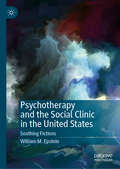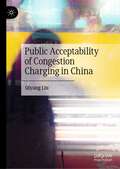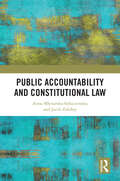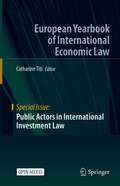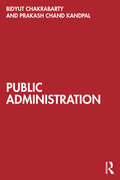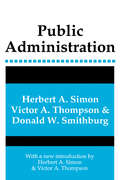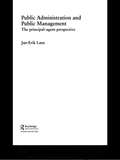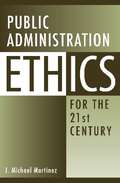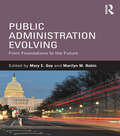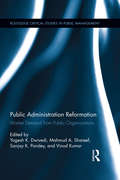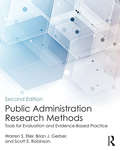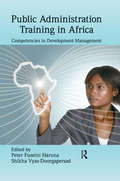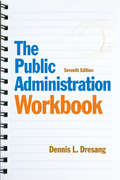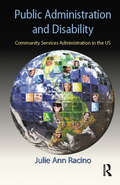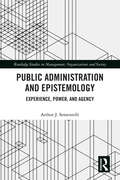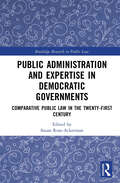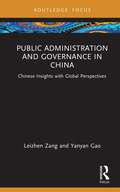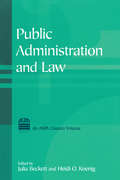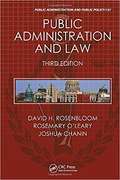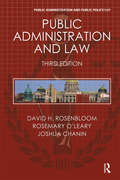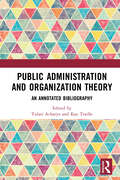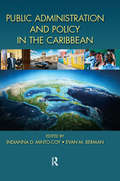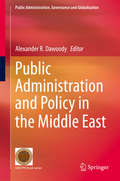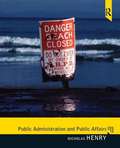- Table View
- List View
Psychospace
by Esther HervyFrance. 2023. One year on after the election of President Edouard, Emmanuel Macron’s successor. The French Employment Code is in the process of being ripped up, so people are clinging desperately to the jobs they hold. Julie has just been laid off from the Robarti Legal Bank, but miraculously she finds a new book-keeping post at Gargill & Co., the second biggest pesticide company after Tonsantar. She needs to eat and pay her bills, but does that mean she has to put up with absolutely everything from her new employer? Has everyone else surrendered to the belief that they’ve no choice other than to keep quiet and toe the line? Or are there still people prepared to fight back?
Psychotherapy and the Social Clinic in the United States: Soothing Fictions
by William M. EpsteinThis book offers a compelling critical analysis of American society by examining the role of psychotherapy within social policy and the culture that has fashioned it. It takes a deeply critical look at ‘the social clinic,’ defined here as a ubiquitous organizational arrangement that includes clinical and community psychology, counseling, clinical social work, psychiatry, much of the self-help industry, complementary and alternative medicine and others. Epstein’s analysis concludes that the social clinic lacks credible evidence of effectiveness and its continued popularity expresses popular but predatory American values such as romantic individualism, the triumph of the subjective, a sense of personal and political chosenness, persistent bigotry, and a preference for tribal as opposed to civic identities. This careful examination of American society through the lens of psychotherapeutic practice characterizes the social clinic as a soothing fiction of the United States.The book offers caring services as the unrealized alternative to clinical treatment, capable of achieving greater personal adjustment as well as social and economic equality. It will appeal to readers with an interest in social welfare, public policy, and public administration, as well as to students and scholars of psychotherapy, counseling, social work, rehabilitation, and community psychology.
Public Acceptability of Congestion Charging in China
by Qiyang LiuThis book explores the public acceptability of congestion pricing in the Chinese context. Successful in western cities, notably London, congestion pricing has overcome vested interests to revitalize city centers and reduce pollution. Given the radically different nature of China's culture and political system, the author articulates why public acceptability should be an issue and how it will look in an authoritarian context. Based on stakeholder interviews, focus groups and an attitudinal survey, this book will interest policymakers, planners, and scholars of transport governance.
Public Accountability and Constitutional Law
by Anna Młynarska-Sobaczewska Jacek ZaleśnyThis book analyses the public accountability of political actors in contemporary democratic states. Accountability as understood here is a necessary condition of democracy: delegation of power with transparency and supervision over those who are chosen to exercise the power of the state. The authors identify paths of executing accountability in the electoral process, as well as in traditional instruments of parliamentary scrutiny and other relationships between the legislative, executive and judicial branches. They track how well-known mechanisms of democracy fulfil the need to report on the exercising of an entrusted power. They also explore how new developments in the constitutional framework, that is, the post-evaluation of legislation, and beyond it in mass social movements, Big Tech companies and social media, are changing the classic and established concepts of accountable power. The book will be a valuable resource for academics, researchers and policymakers working it the areas of Constitutional Law and Politics and Accountability Studies.
Public Actors in International Investment Law (European Yearbook of International Economic Law)
by Catharine TitiThis open access book focuses on public actors with a role in the settlement of investment disputes. Traditional studies on actors in international investment law have tended to concentrate on arbitrators, claimant investors and respondent states. Yet this focus on the “principal” players in investment dispute settlement has allowed a number of other seminal actors to be neglected. This book seeks to redress this imbalance by turning the spotlight on the latter. From the investor’s home state to domestic courts, from sub-national governments to international organisations, and from political risk insurance agencies to legal defence teams in national ministries, the book critically reviews these overlooked public actors in international investment law.
Public Administration
by Bidyut Chakrabarty Prakash Chand KandpalThis textbook is a comprehensive, student-friendly guide to understanding the fundamentals of public administration. It examines the recent developments and relevant theoretical underpinnings in an accessible manner.Public Administration: Helps students grasp key dialectical interconnections between theoretical conceptualizations and prevalent socio-economic and political circumstances Provides understanding of issues in governance Analyses significant transformations in civil society and administrative set-ups across the world Highlights the contributions of non-Western thinkers in the development of conceptual ideas of the discipline Accessibly written, it caters to a wide range of university syllabi in public administration and will be essential for students and researchers of political science, public policy and public administration. It will also be particularly useful for those preparing for the civil service examinations.
Public Administration
by Herbert A. Simon Donald W. Smithburg Victor A. ThompsonAt the time of its initial publication, Public Administration helped to define this field of study and practice by introducing two major new emphases: an orientation toward human behavior and human relations in organizations, and an emphasis on the interaction between administration, politics, and policy. Without neglecting more traditional concerns with organization structure, Simon, Thompson, and Smithburg viewed administration in its behavioral and political contexts. The viewpoints they express still are at the center of public administration's concerns.
Public Administration & Public Management: The Principal-Agent Perspective
by Jan-Erik LaneA perspective on the public sector that presents a concise and comprehensive analysis of exactly what it is and how it operates. Governments in any society deliver a large number of services and goods to their populations. To get the job done, they need public management in order to steer resources – employees, money and laws – into policy outputs and outcomes. In well-ordered societies the teams who work for the state work under a rule-of-law framework, known as public administration. This book covers the key issues of: the principal-agent framework and the public sector public principals and their agents the economic reasons of government public organization, incentives and rationality in government the essence of public administration: legality and the rule of law public policy criteria: the Cambridge and Chicago positions public teams and private teams public firms public insurance public management policy Public Administration & Public Management is essential reading for those with professional and research interests in public administration and public management.
Public Administration Ethics for the 21st Century
by J. Michael MartinezThis volume establishes a foundation for a uniform code of professional ethics for public administrators in the United States. * Four cases of ethical and unethical decision making in context--Nathan Bedford Forrest, William Calley, Adolf Eichmann, and Mary Anne Wright--who resigned in protest over the 2003 invasion of Iraq * Six figures depicting the process of ethical decision making within a public organization * An extensive bibliography listing of the major sources on administrative ethics in print and online * An index of key thinkers and theories involving administrative ethics
Public Administration Evolving: From Foundations to the Future
by Mary E. Guy and Marilyn M. RubinPublic Administration Evolving: From Foundations to the Future demonstrates how the theory and practice of public administration has evolved since the early decades of the twentieth century. Each chapter approaches the field from a unique perspective and describes the seminal events that have been influential in shaping its evolution. This book presents major trends in theory and practice in the field, provides an overview of its intellectual development, and demonstrates how it has professionalized. The range from modernism to metamodernism is reflected from the perspective of accomplished scholars in the field, each of whom captures the history, environment, and development of a particular dimension of public administration. Taken together, the chapters leave us with an understanding of where we are today and a grounding for forecasting the future.
Public Administration Reformation: Market Demand from Public Organizations (Routledge Critical Studies in Public Management #18)
by Yogesh K. Dwivedi Vinod Kumar Mahmud A. Shareef Sanjay K. PandeyIn an attempt to instil trust in their performance, credibility, integrity, efficiency, cost-effectiveness, and good governance, many public organizations are in effect viewing tax-paying citizens as consumers. Little research exists to explore synergies between the market economy, public administration reformation, and their complex bilateral effects. This book takes a timely look at the heightened need for public administration reform as a result of the economic challenges currently faced by nations across the globe. In particular it explores the roles of eGovernment and a citizen-centric focus in this transformation. Public Administration Reform examines several commonly-held assumptions about public administration: the public sector is slow and bureaucratic; government employees are frequently disengaged; and government agencies are sometimes wasteful. eGovernment is proposed as a key tool in the improvement of both public services and reputations of public organizations.
Public Administration Research Methods: Tools for Evaluation and Evidence-Based Practice
by Scott E. Robinson Warren S. Eller Brian J. GerberThe best decisions made by public managers are based not on instinct, but on an informed understanding of what’s happening on the ground. Policy may be directed by ideology, but it must also be founded on reality. The challenge of making the right decisions as a public manager is often, therefore, based on the need for rigorous, actionable research. Now in a thoughtfully revised second edition, this textbook shows students of Public Administration exactly how to use both qualitative and quantitative research techniques to give them the best chance to make the right decisions. Uniquely, Eller, Gerber, and Robinson present research methodologies through a series of real-life case studies, with each chapter exploring situations where a public manager can use research to answer specific questions, demonstrating how that research can inform future policy. Taking readers through the key concepts, from research design and sampling to interviews, survey data, and more statistical-based approaches, this new edition provides a complete guide to using research in the public and voluntary sectors. New to this edition: To better orient the student, the second edition is thematically arranged. Five sections, each with a short essay, provide not only previews of the content of each section, but more importantly guide the reader through how the concepts and techniques covered relate to real-world use and application. A new chapter on applied quantitative analyses has been added to offer coverage of several commonly-used and valuable analytic techniques for decision making for policy and management: benefit-cost analysis, risk assessment, and forecasting. The second edition is accompanied by online materials containing suggested course plans and sample syllabi, PowerPoint lecture slides, and student support materials to illustrate the application of key concepts and analytic techniques. Each chapter also includes discussion questions, class exercises, end of chapter review questions, and key vocabulary to provide students with a range of further tools to apply research principles to practical situations.
Public Administration Training in Africa: Competencies in Development Management
by Peter Fuseini Haruna Shikha Vyas-DoorgapersadThere is a growing global interest in Africa and how to improve the quality of life of its people and for good reason. The world can no longer afford to ignore the democratic changes that have occurred across the continent over the past two decades, changes with tremendous implications for professional education and training for the tasks of nation
Public Administration Workbook, The, CourseSmart eTextbook
by Dennis DresangThis unique workbook engages students in the study of public administration and helps them gain a deeper understanding of the field by providing exercises that expose them to a wide range of practical applications. Connecting theory to practice, a brief theoretical introduction precedes each exercise, explaining why the technique is important and how it is relevant to the study and practice of public administration. Key Features: A participatory approach to the key topics in public administration engages students and provide them with practical experience. Theoretical discussions prior to each exercise root the material in theoretical context and enable students to understand the importance and relevance of the exercise. A detailed Instructor's Manual, written by Dennis Dresang, guides instructors with solutions, explanations, and suggestions for using (and modifying) the exercises to fit a variety of course needs. Downloadable datasets and exercises make it easier than ever to assign, submit, and grade assignments electronically.
Public Administration and Disability: Community Services Administration in the US
by Julie Ann RacinoBased on decades of evidence-based research and technical assistance, Public Administration and Disability: Community Services Administration in the US brings together the diverse, expert perspectives and discusses the leading efforts of the past three decades in the field of disability and community services. The book highlights the development of
Public Administration and Epistemology: Experience, Power and Agency (Routledge Studies in Management, Organizations and Society)
by Arthur J SementelliKnowledge does not happen in a vacuum, yet scholars and other professionals tend to engage in management scholarship focused on their specific niche often without knowing if or how their work might relate to other research streams. Further exacerbating things, people within specific disciplines, including management, tend not to communicate regularly outside of their relatively homogeneous audiences. If we were able to bridge communication among these groups, scholars, and practitioners, we might be able to better understand one another in a way that is contextually informed by each other’s experiences. Sementelli argues that understanding concepts of power, agency, and experience can provide such tools to orient management theories and practices relative to one another. Using critical management thought to frame a discussion of ontology and how knowledge emerges from it enables the development of an orienting "sandbox" that works both practically and intellectually. Such a "sandbox" enables us not just to communicate one’s organizational priorities but also reveal some underlying reasons for those priorities and areas of inquiry. This monograph focuses on public administration in particular as a special case of critical management research. This book also examines the complexity of experiences (of being) using Karl Jaspers as a basis. The sandbox that emerges can be used as a way to organize and orient management thought, especially in the public sector. It contributes both to administrative thought and applied inquiry into philosophy and will be of interest to researchers, academics, and students in the fields of critical management studies, organizational studies, and public administration.
Public Administration and Expertise in Democratic Governments: Comparative Public Law in the Twenty-First Century (Routledge Research in Public Law)
by Suan Rose-AckermanThis collection deals with challenges confronting public law and public administration in twenty-first century democracies across the world. It draws together contributions from leading scholars, examining cutting-edge topics, and projecting the scholarship forward. It emphasizes the importance both of justifying executive policymaking to citizens and of drawing on bureaucratic expertise and professional competence. Contributors examine the role of courts and argue for new forms of public participation that can incorporate democratic values into executive-branch policymaking. Finally, the work confronts problems in the administration of the criminal law that are generating increased public concern. Building on Rose-Ackerman’s scholarship, writers compare the American experience with contemporary developments in other leading democracies – in particular, Germany, France, the EU, Canada, and Latin America. The work will be an invaluable resource for academics, researchers and policymakers working in the areas of Administrative Law, Public Law, and Political Science.
Public Administration and Governance in China: Chinese Insights with Global Perspectives (Routledge Focus on Public Governance in Asia)
by Leizhen Zang Yanyan GAOThis book aims to explain the gap between Western theories and the Chinese administration reform experiences. The book provides insights into how the Chinese government can improve its efficiency and legitimacy through reforms and adapt Western theories with Chinese Characteristics. It also looks at the impact of modern technological innovation on reforms and why innovation is a critical key to the political development of China or other countries. The authors also explain how the Internet affects government efficiency. This timely book is an invaluable reference to better understand the changing theory of global public administration and its practice in developing countries and will interest researchers and policy makers in development studies and public administration and governance.
Public Administration and Law (Aspa Classics Ser.)
by Julia Beckett Heidi O. KoenigPublic Administration and Law has been edited for use as a supplement for an undergraduate or MPA level course on administrative law. The selections, all from the pages of Public Administration Review, have been chosen to enlighten and enliven the contents of any standard administrative law textbook. Each of the book's main sections begins with introductory text and discussion questions by the volume editors, Julia Beckett and Heidi Koenig, followed by relevant readings from PAR. The book's contents follow the standard pattern established by the field's major textbooks to facilitate the instructor's ability to assign readings that illuminate lectures and text material. The book concludes with two invaluable resources - a bibliography of 65 years of PAR articles concerning public law, plus a bibliography of law-related articles appearing in other journals published by ASPA.
Public Administration and Law (Public Administration and Public Policy #157)
by Rosemary Oleary Joshua Chanin David RosenbloomSince the first edition of Public Administration and Law was published in 1983, it has retained its unique status of being the only book in the field of public administration that analyzes how constitutional law regulates and informs the way administrators interact with each other and the public. Examining First, Fourth, Fifth, Eighth, and Fourteenth Amendment rights as they pertain to these encounters, it explains how public administrators must do their jobs and how administrative systems must operate in order to comply with constitutional law.
Public Administration and Law (Public Administration and Public Policy)
by David H. Rosenbloom Rosemary O'Leary Joshua ChaninSince the first edition of Public Administration and Law was published in 1983, it has retained its unique status of being the only book in the field of public administration that analyzes how constitutional law regulates and informs the way administrators interact with each other and the public. Examining First, Fourth, Fifth, Eighth, and Fourteenth Amendment rights as they pertain to these encounters, it explains how public administrators must do their jobs and how administrative systems must operate in order to comply with constitutional law. Explores the conflicts between laws The book begins by presenting a historical account of the way constitutional and administrative law have incrementally "retrofitted" public agencies into the nation’s constitutional design. It examines the federal judiciary’s impact on federal administration and the effect of the nation’s myriad environmental laws on public administration. Next, it focuses on the role of the individual as a client and customer of public agencies. In a discussion of the Fourth Amendment, it examines street-level encounters between citizens and law enforcement agents. Responding to the rise of the new public management (NPM), it also adds, for the first time in this edition, a chapter that analyzes the rights of the individual not only as a government employee but also as a government contractor. Enhanced with numerous references The final chapters of the book address issues concerning the rights of inmates in administrative institutions and balancing the need to protect individual rights with the ability of agencies to function effectively. Supplemented with case citations and lists of articles, books, and documents, this text is designed to facilitate further study in a constantly evolving area. About the Authors: David H. Rosenbloom, Ph.D. is Distinguished Professor of Public Administration in the School of Public Affairs at American University in Washington, D.C., and Chair Professor of Public Management at City University of Hong Kong. Rosemary O’Leary, Ph.D., J.D. is Distinguished Professor of Public Administration and the Howard G. and S. Louise Phanstiel Chair in Strategic Management and Leadership at Syracuse University. Joshua M. Chanin, M.P.A., J.D. is a Ph.D. candidate in Public Administration and Justice, Law, and Society in the School of Public Affairs at American University in Washington, D.C.
Public Administration and Organization Theory: An Annotated Bibliography
by Tulasi AcharyaThe book surveys crucial theories and practices and academic research in the field of public administration and Organizational theory. It outlines ground breaking findings and arising from quality research works from the past to the present—especially focused on articles that are both timely and contextual. Each chapter opens with a theme, explains its relevance within the context and presents a critical annotated bibliography of the articles under the theme and provides a thematic conclusion of the chapter. This book will be a valuable resource for teachers, researchers and students in the field of public administration.
Public Administration and Policy in the Caribbean (Public Administration and Public Policy)
by Evan M. Berman Indianna D Minto-CoyThe Caribbean is at a crucial phase in its development. Global and local pressures have seen the region losing its competitiveness, while it remains at risk of losing out on development gains made in the last few decades. These pressures are demanding improvements in the way government operates, particularly in its policy-making and administrative
Public Administration and Policy in the Middle East
by Alexander R. DawoodyThe various and different Middle Eastern countries are addressing new key reform and governance reform processes but also administration and policy issues of enduring importance; decentralization and local government, non-profit organizations, political culture, and reform of the policy process. This book provides assessment of national strategies for reform in public administration and policy, how these strategies have fared in implementation; and what challenges must be overcome to achieve real and sustainable progress. Seven country case studies will explore the overall policy-making process from a critical perspective and consider how it could be strengthened. Four cases will deal with the controversial issues of decentralization of power and decision-making. Two cases will address the role of civil society in the policymaking and reform process. Introductory and concluding chapters will place these discussions in context and draw the primary lessons for policy-makers. The main objectives of the book are to present different examples of specific public policy and administration, as well as governance issues in the Middle East so that policymakers (both in the region and the world who are interested in the Middle East), as well as practitioners, scholars and graduate students can utilize the book as a study guide to better understand various dynamics in governance in the Middle East. This approach will enable the volume to bridge global perspectives on governance development with regional perspectives and experience, bringing shared expertise, intellectual inquisitiveness, and experience in the professional practice of public policy and administration to bear on these common challenges.
Public Administration and Public Affairs
by Nicholas HenryUpdated in its 12th edition, Public Administration and Public Affairs shows readers how to govern efficiently, effectively, and responsibly in an age of political corruption and crises in public finance. With a continuing and corroding crisis occurring, as well as greater governance by nonprofit organizations and private contractors, it is vital that readers are given the skills and tools to lead in such an environment. Using easy-to-understand metaphors and an accessible writing style, Public Administration and Public Affairs shows its readers how to govern better, preparing them for a career in public administration.

